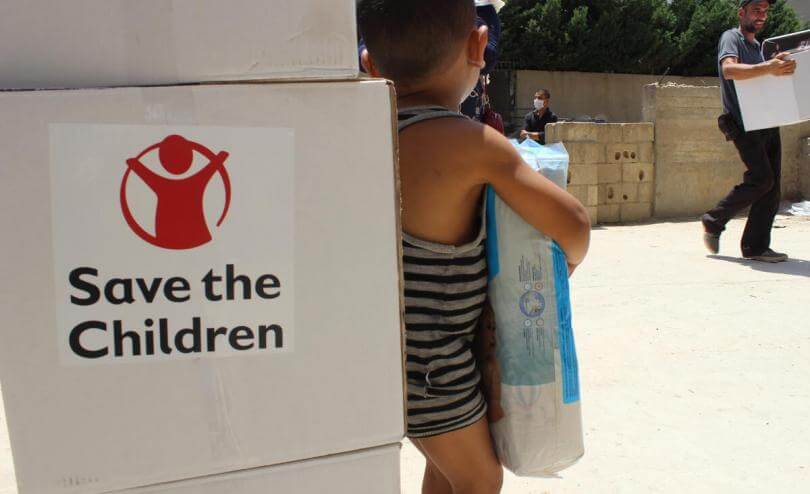
Almost 600 million children completely missed out on Financial Support during COVID-19
Before the COVID-19 outbreak just 35% of children globally received social protection benefits, falling to 28% in Asia and as little as 16% in Africa
Families from at least 594 million children in low-and-middle income countries did not receive any child and family-specific financial support from their governments to face the COVID-19 pandemic, Save the Children revealed today.
Millions of families have been pushed over the brink of poverty since the start of the outbreak as parents lost their work, impacting children’s access to healthcare, education, food and housing. While hundreds of millions of families needed extra support to provide for their children, at least 68 low-and-middle income countries did not provide it, impacting more than 594 million children.
Even before the outbreak, over 1 billion children in low- and middle-income countries lived in multidimensional poverty, deprived of access to education, health, housing, nutrition, sanitation, or water. Since the Coronavirus outbreak, this number increased with 150 million children, bringing the total to 1.2 billion.
“We know that COVID-19’s economic impact will be long-lasting. Without protecting family incomes, the impact for vulnerable children could be life-long. Globally, families are already facing uncertain futures as the impact of climate change is making job markets increasingly unpredictable. Children deserve the best possible start in life, and we know that the economic case for investing in children is strong. It’s not a question of is this affordable, but: can we afford not to?”, said Yolande Wright, Save the Children’s Director of Poverty Reduction, Climate Resilience, Gender Equality and Inclusion.
Last month, data from Save the Children compiled in the largest survey of its kind on the impact of COVID-19 on children, already revealed that around 75 percent of participants[i] who had lost all their incomedid not receive any government support. The global survey also found that COVID-19 crisis was widening inequalities, with lower income families hit hardest financially.
Paula*, 17, from Mozambique said:
“The situation is not good. Here in my area there are children who have to sell things on the street because their parents have no jobs. People have nothing to eat and if they stay at home, they will starve to death. The government should give support to families and assist families. Here people are selling things because there is no way to support themselves.”
Investing one percent of a country’s economic output in stability for children could lead to a reduction of poverty of 20 percent or higher
In response to the COVID-19 pandemic nearly all countries announced social protection measures like cash transfers, food or vouchers, or waiving financial obligations to help families face the impact of the pandemic[ii]. But as economies suffered increased hits, 68 low-and-middle income countries did not introduce any child specific or family allowances, leaving families relying on unpredictable top up schemes, Save the Children said. The organisation warned that COVID-19 could set back more than a decade of progress in reducing child poverty and deprivation.
In its report A Foundation to End Child Poverty, which was launched today, Save the Children stresses that now more than ever, countries need make progress towards universal child benefits. These investments – regular and reliable cash transfers to care givers of children – are needed in the fight against child poverty, and to help families mitigate the impacts of future crises.
Inger Ashing, CEO of Save the Children, said:
“All parents want what’s best for their children and will invest in their futures – if they have the means. Evidence shows that if parents, especially women, receive regular benefits or cash transfers, they will provide their children with health care, an education and nutritious food. It breaks the suffocating poverty cycle and reduces harmful practices like child marriage or child labour.”
Investing in child benefits not only helps children and their families but also local and national economies, as families spend their money on local goods and services, Save the Children said. Before the COVID-19 outbreak just 35% of children globally received social protection benefits, falling to 28% in Asia and as little as 16% in Africa[iii].
With its report, Save the Children calls on governments to invest one percent of their GDP in social protection schemes for children.
Ms. Ashing continued: “If the COVID-19 pandemic has taught us anything, it’s that people need a sound, financial basis to face shocks like a pandemic. Investing one percent of a country’s economic output in stability for children could lead to a reduction of poverty of 20 percent or higher[iv]. The answer is staring us right in the face, and could build a real foundation for a future free of child poverty.”
In the report, Save the Children highlights a range of measures governments have taken to create more fiscal space to enhance or implement child focused social protection and benefits, initially aimed at the youngest children.
It also calls on donors, private creditors and the wider global community to assist through debt relief, and suspension where possible, by maintaining and expanding their financial and technical support for social protection; and by joining international calls for a global fund for social protection to ensure countries can move towards Universal Child Benefits.
*name changed for privacy reasons

